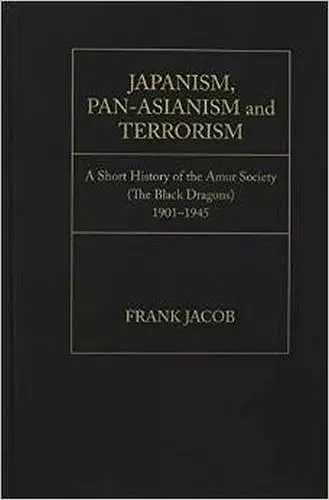Japanism, Pan-Asianism and Terrorism
A Short History of the Amur Society (The Black Dragons)1901-1945
Format:Hardback
Publisher:Academica Press
Published:30th Jul '14
Currently unavailable, our supplier has not provided us a restock date

This monograph is the first modern research study in English to provide history of the Amur Society ( known as Black Dragon Society due to a mistranslation from Japanese to English), its genesis, its members and its activities in historical context from 1901-1945. Using original sources, some consulted for the first time, Dr Jacob discusses the Amur Society as a key driving force in Japan's embrace of national expansion and analyses the effect of this ultra-nationalist secret society on Japanese history from before the Russo-Japanese War(1901 ) to the bitter defeat of 1945 and the end of colonial empire, military rule and international aggression .
The Amur Society was seen by its enemies as an almighty secret society, one which determined the course of Japanese history from the murky background of Japanese civil and military politics.
Founded in 1901 the Amur-Society was aimed at stopping the Russian expansionist ambitions in East Asia and preparing Japan for a war against the tsardom. The members of the society followed a double-sided strategy to achieve this goal. In public they rooted for an anti-Russian mood of the Japanese society by starting a propaganda campaign which consisted of pamphlets and public lectures. In secret their members began spying in Korea, Manchuria and even Siberia gathering information would be of value during the upcoming war with Russia.
Although the Russo-Japanese War started in 1904/05 and the Japanese troops gained victory after victory, the diplomats were not able to build on these t victories during the negotiations in Portsmouth, NH where Russia - especially Sergej Witte - won the only Russian victory of that conflict. Although the Kokuryûkai( Amur Society) ,due to the conclusion of the war and the Russo-Japanese diplomatic relations in the years after 1905, had lost its raison d'être it still till 1946. During the years after 1905 the society became more engaged in Korean affairs and tried to accelerate a political unification with Korea and the destruction of Korean cultural and political elites as well as Christian religious practice. After Uchida Ryôhei (the leader of the society) was not able to influence Ito Hirobumi -governor general in Korea - he returned to Japan and the Kokuryûkai involved in influencing Japanese society...
ISBN: 9781936320752
Dimensions: unknown
Weight: unknown
284 pages